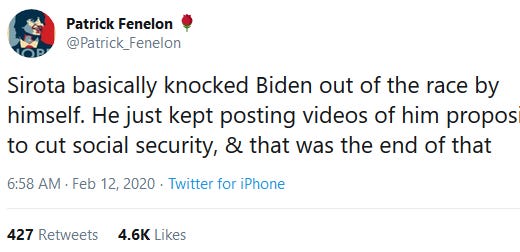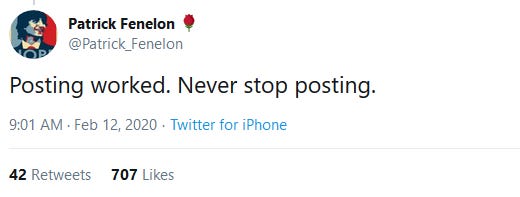The terrific triviality of Twitter
Twitter strikes fear into the heart of millions. But how much real power does it have?
Anyone who’s read my writing over the years knows that I have this weird obsession with Twitter. I’ve come to believe that Twitter — not Facebook, not “social media”, but that one single platform — represents a huge and fundamental change in how human society works. The combination of openness (anyone can talk to anyone), anonymity, and people’s inability to curate the replies to their tweets means that now there’s a village square that everyone in the whole world — or at least, everyone with a Twitter account — is present in, all the time. That’s new. That has never happened before, in all the time that humans have been on this planet.
And whenever you get some new technology that fundamentally changes human society, there are going to be problems to work out. For Twitter, one of those problems is that the platform — and thus, our public discourse — is dominated by the people with the time, energy, and inclination to shout at and denounce each other all the time. Those are probably not the people we’d pick to dominate our discourse, if we got to pick. A second issue is that Twitter allows restless, grievance-laden people to overthrow the leadership of organizations they’re a part of, by rallying outside anger to their cause. On top of that, Twitter makes social ostracism much more unforgiving and terrifying. And it creates strange and often toxic status relationships.
And yet there are times when Twitter seems all-powerful and it turns out to be an illusion. In 2016, many online rightists believed that they had “memed a President into office”. But when aggressive, exuberant young socialists attempted to repeat the feat in the Democratic primary of 2020, it, ah…did not achieve the desired effect.
Sometimes the saying that “Twitter isn’t real life” is true! But sometimes Twitter actually is real life, like when outrage on the platform gets people fired from their jobs.
How do we tell the difference? I think it requires that we understand that much of Twitter’s seeming power is based on two fundamental illusions. If these illusions were widely recognized, the platform would see its power and importance shrink dramatically. The illusions are:
The illusion of numbers, and
The illusion of consequences.
Concentration as a force multiplier
On Twitter, discourse generally proceeds as a series of denunciations (quote-tweets) and arguments (replies). People judge their tweet’s performance by comparing this negative feedback to the amount of positive feedback from likes and retweets. If negative outweighs positive, a tweet is considered to be “ratioed”, i.e. a failure in the court of public opinion.
But suppose you want to make someone feel bad about a tweet, or retract it, or feel afraid to say similar things in the future. All you need to do is gather a relatively small gang of like-minded tweeters and concentrate your fire. Most people don’t get more than a couple dozen retweets and a couple hundred likes on any given tweet, so if you can get 500 people to write scathing replies and denunciatory quote-tweets, you can usually overwhelm the positive feedback. (And it’s not hard to get 500 people for your gang, especially when you can recruit from the entire world, including bored teenagers.) Then you and your gang move on to the next target. Repeat all day, every day.
Doing this, a group of tweeters pushing a particular ideology can create the illusion of a vast, spontaneous mob. For some groups, the tactic is intentional; for others, it happens naturally just from having a bunch of angry like-minded people with a lot of time on their hands, looking for the next person to ratio. Even if it’s the same 500 people ratio-ing each tweet, the people getting ratioed generally don’t realize that. Each victim of this roving mob tactic feels like the entire public is against them.
(In fact, this kind of tactic redefines the entire idea of “the public”. James Grunig defined publics situationally — basically, as the set of people who decide they have a problem and decide to do something about it. A roving ideological Twitter mob is thus a species of micro-public — a group that’s always looking for the next tweet to problematize.)
Getting ratioed makes people feel like the world of public opinion is against them, even when it’s just a tiny angry fringe. This is the illusion of numbers. It gives tiny, angry fringes enormous power over the opinions and speech of normal people who don’t have an online gang to back them up.
So what if you get ratioed?
The illusion of numbers works by convincing people that the world disapproves of what they wrote. But there’s another illusion that gives ratio-mobs outsized power — the sense that something bad will happen to you if you get ratioed. I call this the illusion of consequences.
You might think that having a bunch of people get mad at you on social media might carry negative consequences for your career, or ruin your reputation. But the vast majority of the time, nothing actually happens. You get yelled at. Then it stops. People move on. And nothing changes in your life at all!
As one example of this, consider our old friends, the tankies. The other day, tankies and their various allies from the political hard Left got very very mad at Slate economics writer Jordan Weissmann for daring to suggest that the U.S. helped the Soviet Union defeat the Nazis:
Tankies and other various Soviet apologists and Cold Warriors are very defensive of the idea that the USSR beat the Nazis without U.S. help. This allows them to preserve their fantasy of Soviet heroics (this is complete B.S.; the USSR initially allied with Hitler, and the only reason they ended up doing the bulk of the fighting was because Hitler backstabbed and invaded them, forcing them to fight or die). Jordan’s calm, reasonable tweets punctured their fantasy and enraged them, which is why they ratioed him.
But consider what consequences Jordan has suffered as a result of getting ratioed by tankies. Absolutely none. He is not less popular or less respected. His career is unaffected. The rage of the tankie mob has done absolutely nothing to Jordan Weissmann besides annoy him. He can just hit the “mute conversation” button, and the whole shitstorm will evaporate in an instant.
As another example, take Jennifer Doleac, an economist at Texas A&M University. Jennifer occasionally says unpopular things on Twitter and gets ratioed for them. For example, here is her getting ratioed when she criticized the minimum wage:
Now, unlike Jordan, Jennifer is probably wrong here (if I know my RA jobs, she’ll probably hire the same number of RAs but let them bill fewer hours). Also, the evidence that minimum wage doesn’t kill many jobs vastly outweighs any personal anecdote. And the people that ratioed Jennifer are regular people, not psychotic commie trolls. This is not an illusion-of-numbers situation, like with the tankies.
But nothing happened to Jennifer either! Her job is fine. Her career is fine. She didn’t even lose any Twitter followers. People she cares about still talk to her and respect her; she has not been shunned out of polite society. In fact, she seems utterly unperturbed by the experience, even going so far as to discuss it openly — and getting ratioed again for discussing it:
People are instinctively afraid of social opprobrium. Our instincts, whether inherited or learned, come from small close-knit communities in which being the subject of mass anger could carry dire consequences. But Twitter, this new technology that simulates a public square, doesn’t actually behave like a small, close-knit community; you can draw the ire of tens of thousands and be in zero danger.
But some people really do suffer consequences for things that happen on Twitter. Jennifer uses the word “cancelled” to mean being ratioed, but when most people use it, they’re probably envisioning far more serious consequences, like people getting fired from their jobs.
Corporations and cancellations
People do get fired from their jobs after inciting Twitter rage — for example, Justine Sacco, who made a clumsy joke about White privilege and ended up getting the sack after a Twitter backlash. In fact, the list of people who have been fired for tweets is pretty long.
The question is: Why were they fired? I don’t mean the morality of it; whether I agree with or disagree with the individual firings is not the issue here. What I mean to ask is, why did these people’s employers think that firing them was a necessary business decision?
Every company has a Twitter account, and when people are mad at one of the company’s employees, they tweet angrily at the corporate Twitter account. To managers at a company, this can seem like a dangerous and threatening thing — no business wants massive bad publicity! So when they see a wave of popular anger incoming, the easiest thing to do is generally to just fire one person and make the anger go away. Easy fix, problem solved. If you know American businesses, you know that firing people is not generally something that keeps them up at night.
But if the companies had had some pressing reason not to fire their employees, and had decided to stick it out, what actual negative consequences would they have suffered? Had IAC not fired Justine Sacco, would people have really boycotted it? Who the hell even knows what IAC does, or would be able to identify an IAC product? And even more importantly, who would remember and still care about the outrage enough to maintain a boycott of IAC for longer than a few days?
Twitter outrage is like a summer squall — it strikes hard, but then moves on fast. That also means that there are many, many targets of outrage — far too many for any kind of organized or sustained boycott, except perhaps in one or two extreme cases. In other words, if you’re a business, and Twitter wants you to fire someone, you can probably just ignore the whole thing, release some bland statement, and wait a couple of days until the mob picks another target. You’re incredibly unlikely to suffer any kind of boycott or loss of business.
So what would it take for Twitter’s get-people-fired weapon to be neutralized? Companies just need a reason to stop firing people because Twitter demands it. One reason could be corporate managers across America developing a strong sense of ethical…never mind, I can’t even finish that sentence without laughing. The only way companies are going to stop firing people at Twitter’s behest is if the fired people sue and sue and sue and sue.
Now, its important to note that neutering the Twitter mob would have its downsides. Twitter has given voice and power to a lot of people who didn’t have much before, and if companies started ignoring the platform’s outburst of rage, much of that newfound power would evaporate. Some of the people being fired undoubtedly deserve it, even as others don’t.
But in any case, it seems like only a matter of time before both people and corporations realize that Twitter mobs are largely paper tigers. Humans have never before lived in a society where everyone is getting yelled at all the time by strangers. But we’re in that society now, and we will eventually adapt to it.







>Twitter has given voice and power to a lot of people who didn’t have much before, and if companies started ignoring the platform’s outburst of rage, much of that newfound power would evaporate.
Power is a zero-sum game. From whoever's grasp the Twitter mob may have wrested power, I rarely feel they are wielding it in my interests. One oligarchy has been swapped out for another. I've met the new boss, and I generally prefer the old boss.
Seems like stronger unions could protect workers from managers who overreact to Twitter mobs by firing then.